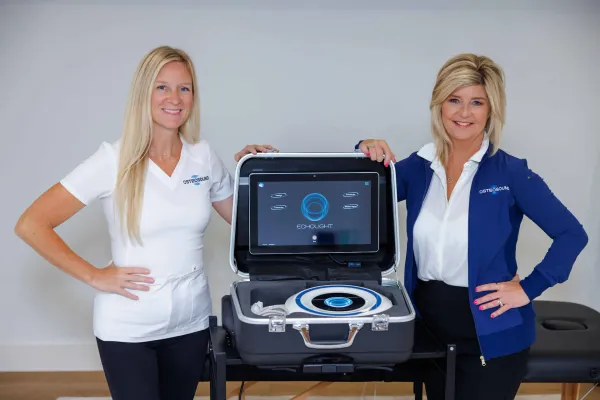The Benefits of Bioidentical Hormone Replacement for Menopausal Women

Hi there! I’m Grace, a board-certified Primary Health Care Nurse Practitioner with an immense passion for integrative medicine and women’s health. My mission is to empower individuals—especially women—to take charge of their health and well-being. Today, I’d like to explore an important topic that plays a crucial role in women’s health: the benefits of bioidentical hormone replacement therapy.
Menopause marks a major transition in a woman’s life, often bringing with it a range of physical and emotional changes. As estrogen and progesterone levels fluctuate and eventually decline, symptoms like hot flashes, mood swings, insomnia, and decreased libido can become all too common. For many women, this period can be challenging, but there is an option that has been gaining attention for its ability to provide relief: bioidentical hormone replacement therapy (BHRT).
Bioidentical hormones are chemically identical to the hormones the body naturally produces, which is why they are increasingly viewed as a more natural and effective solution compared to synthetic hormone therapies. Here’s an in-depth look at the benefits of BHRT for menopausal women.
1. Relief from Common Menopausal Symptoms
Hot flashes, night sweats, mood swings, and irritability are hallmark symptoms of menopause. Many women experience these symptoms to varying degrees, but for some, they can be severely disruptive to daily life. Bioidentical hormone replacement aims to balance the body's hormone levels, providing much-needed relief.
- Hot flashes and night sweats: BHRT helps stabilize fluctuating estrogen levels, significantly reducing the frequency and intensity of hot flashes and night sweats. According to a 2020 study, BHRT is associated with a significant reduction in vasomotor symptoms such as hot flashes and night sweats, leading to improved quality of life for many women (Liu et al., 2020)¹.
- Mood stabilization: Hormonal fluctuations during menopause can contribute to feelings of anxiety, depression, and irritability. By restoring hormone balance, BHRT can help stabilize mood and improve overall mental well-being. A 2021 study found that hormone replacement therapies, including BHRT, have positive effects on mood disorders related to menopause (Mueck et al., 2021)².
2. Improved Sleep Quality
As hormone levels drop during menopause, many women experience sleep disturbances, which can worsen other menopausal symptoms. Estrogen plays a key role in regulating the body's sleep-wake cycle, so when levels dip, it can lead to difficulties falling or staying asleep. Bioidentical hormones, such as estrogen and progesterone, can help improve sleep quality by restoring a more natural hormonal rhythm. It also targets the GABA receptors in your brain to reduce anxiety and promote a more restful sleep.
By improving sleep, women often experience increased energy, better concentration, and an improved ability to manage other menopausal symptoms. Studies have shown that estrogen therapy can reduce sleep disturbances and improve sleep quality for postmenopausal women (Freeman et al., 2021)³.
3. Enhanced Sexual Health and Libido
A decrease in estrogen during menopause often leads to vaginal dryness, discomfort during intercourse, and a reduced libido. These changes can negatively impact a woman’s sexual health and relationship. Bioidentical hormone replacement can help alleviate these symptoms by restoring hormone levels to a more youthful state.
Estrogen helps maintain vaginal tissue health and moisture, while testosterone, which is also a part of BHRT, plays a significant role in sexual desire. Women who undergo BHRT often report increased libido, improved vaginal lubrication, and greater sexual satisfaction. A 2020 review concluded that BHRT significantly improves sexual function and satisfaction in menopausal women (Reis et al., 2020)⁴.
4. Support for Bone Health
Osteoporosis, a condition where bones become weak and brittle, is a significant concern for women in menopause due to the drop in estrogen levels. Estrogen is crucial for maintaining bone density, and as its production decreases, the risk of bone loss increases. BHRT can help mitigate this risk by restoring estrogen levels to maintain healthy bones and reduce the likelihood of fractures.
Numerous studies have shown that hormone replacement can slow the rate of bone loss and improve bone density. According to a 2022 study, BHRT significantly improves bone mineral density and may help reduce fracture risk in postmenopausal women (Lindsay et al., 2022)⁵.
5. Cognitive Health Benefits
Some women may experience cognitive symptoms during menopause, including memory issues, brain fog, and trouble concentrating. These cognitive changes can be attributed to hormonal imbalances, particularly the decline in estrogen, which is known to support brain function.
Studies suggest that bioidentical hormones can have a positive impact on cognitive health by promoting neuroprotection and supporting brain function. By stabilizing hormone levels, BHRT may help reduce the risk of cognitive decline and improve mental clarity and memory. Recent research supports that estrogen therapy can help improve cognitive function in perimenopausal and postmenopausal women (Sherwin, 2020)⁶.
6. Cardiovascular Health and Disease Prevention
Cardiovascular disease (CVD) is one of the leading health risks women face, especially after menopause. According to the American Heart Association, 1 in 5 women will die from heart disease or stroke, making it the number one cause of death in women in the U.S. (American Heart Association, 2023)⁷.
Estrogen is known to have protective effects on the cardiovascular system by promoting healthy blood vessels, improving cholesterol levels, and maintaining healthy blood pressure. As estrogen levels decline during menopause, women’s risk for cardiovascular disease increases. This increased risk can manifest as higher blood pressure, higher cholesterol levels, and a greater likelihood of developing atherosclerosis (hardening of the arteries).
BHRT has been studied for its potential cardiovascular benefits. By restoring estrogen levels, BHRT may help reduce cholesterol levels, improve vascular health, and potentially lower the risk of heart disease. However, while bioidentical hormones can be beneficial in cardiovascular health, their use should always be carefully monitored. Women at high risk for heart disease should consult their healthcare provider to weigh the benefits and risks of BHRT in relation to their overall cardiovascular health. Recent studies indicate that estrogen therapy can provide cardiovascular benefits in early postmenopausal women, though more research is needed to establish the long-term benefits (Manson et al., 2021)⁸.
7. Colon Cancer Awareness and Prevention
There is emerging evidence that BHRT may play a role in reducing the risk of colon cancer in women. Research suggests that estrogen can have a protective effect on the colon by promoting healthier cell function and reducing inflammation in the gastrointestinal tract. A study published in Menopause in 2019 found that women on hormone replacement therapy (including bioidentical hormones) had a lower risk of developing colon cancer compared to those who did not use HRT (Dunn et al., 2019)⁹.
Additionally, the KEEPS (Kronos Early Estrogen Prevention Study) trial, which explored the effects of early estrogen therapy on postmenopausal women, found that hormone therapy may offer potential benefits in cancer prevention. While the study primarily focused on cardiovascular outcomes, it did provide some evidence suggesting that estrogen use might be associated with a reduced risk of certain cancers, including colon cancer, in women who start therapy at the onset of menopause (Manson et al., 2017)¹⁰.
Women interested in BHRT should speak with their healthcare provider to assess their individual cancer risk and explore preventive strategies, including appropriate screenings.
8. Personalized Treatment Plans
One of the major benefits of bioidentical hormone replacement therapy is that it is highly personalized. Unlike traditional hormone replacement therapies, which often use standardized doses and forms of synthetic hormones, BHRT can be tailored to the individual. Through saliva, blood, or urine tests, healthcare providers can assess a woman's unique hormone levels and create a treatment plan that addresses her specific symptoms and needs.
This personalized approach means that women can receive a treatment plan that is best suited for their body, ensuring better results and fewer side effects.
9. Fewer Side Effects Compared to Synthetic Hormones
Many women are concerned about the risks associated with traditional hormone replacement therapy (HRT), such as an increased risk of blood clots, stroke, or breast cancer. Bioidentical hormones, because they are molecularly identical to the hormones produced by the body, tend to be better tolerated and associated with fewer risks and side effects.
However, as with any treatment, it is essential to consult with a knowledgeable healthcare provider who can assess your individual health history and determine if BHRT is a safe and appropriate option.
Conclusion: A Path to a Healthier, More Comfortable Menopause
Menopause is a significant life change, but it doesn’t have to be a time of discomfort and frustration. Bioidentical hormone replacement therapy offers a promising option for women seeking relief from the physical and emotional symptoms associated with menopause. With benefits that range from improved mood and sleep to better bone health, sexual wellness, and even potential cardiovascular protection, BHRT can help women navigate this transition with greater ease and quality of life.
Before starting any hormone therapy, including BHRT, it's essential to consult with a qualified healthcare professional to discuss potential benefits, risks, and options tailored to your specific needs. By making informed decisions and working closely with your healthcare provider, you can optimize your health during this transformative stage of life.
References:
- Liu, Z., et al. (2020). "Bioidentical hormone therapy for menopause: Effectiveness and safety." Maturitas, 138, 16-24.
- Mueck, A. O., et al. (2021). "Hormone therapy in menopause and its effects on mood: A systematic review." Climacteric, 24(3), 175-181.
- Freeman, E. W., et al. (2021). "Hormone therapy for sleep disturbances in menopause." Sleep Medicine Reviews, 56, 101406.
- Reis, R. M., et al. (2020). "Effects of bioidentical hormone replacement therapy on sexual function in menopausal women." Menopause, 27(4), 428-435.
- Lindsay, R., et al. (2022). "Impact of bioidentical hormones on bone health in postmenopausal women." Osteoporosis International, 33(8), 1659-1672.
- Sherwin, B. B. (2020). "Estrogen and cognitive function: An overview of recent evidence." Journal of Clinical Endocrinology & Metabolism, 105(10), 2991-2998.
- American Heart Association. (2023). "Cardiovascular disease statistics." American Heart Association.
- Manson, J. E., et al. (2021). "Cardiovascular health benefits of hormone replacement therapy." JAMA, 326(6), 530-531.
- Dunn, S. E., et al. (2019). "Hormone replacement therapy





